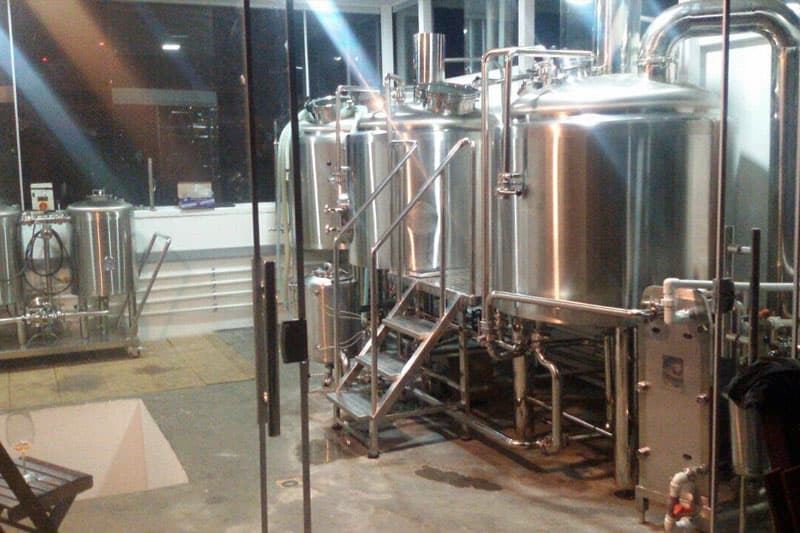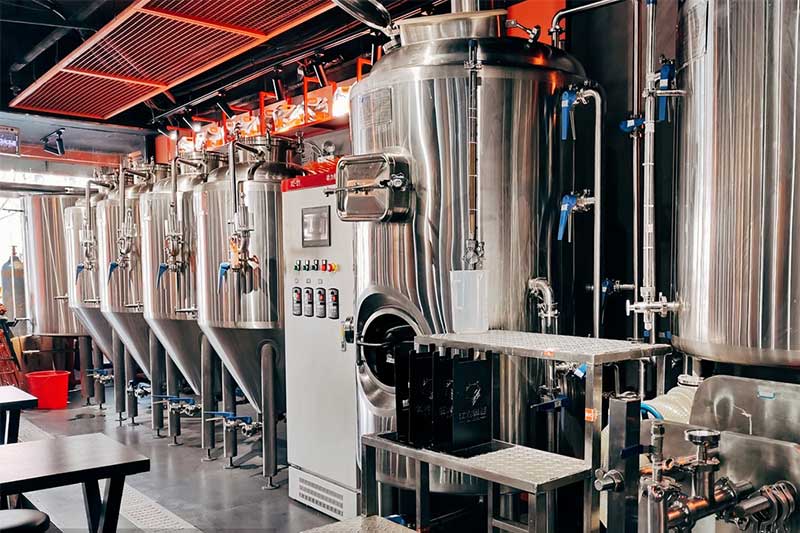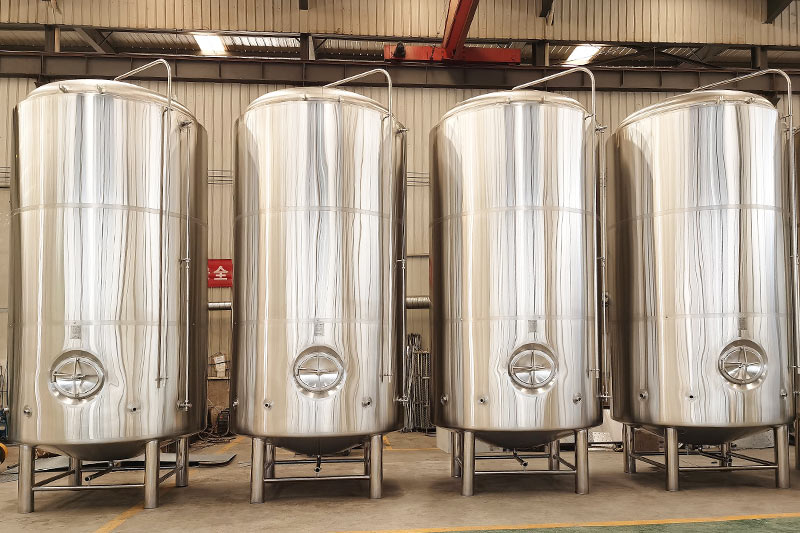Brewing beer is an art that combines tradition with innovation. In today’s fast-paced world, breweries rely on advanced brewing equipment to produce high-quality beers that satisfy the ever-growing demand for unique and flavorful beverages. This article delves into the fascinating realm of beer brewing equipment and the equipment manufacturers who are shaping the industry’s future. Whether you’re a seasoned brewer or just curious about the brewing process, this comprehensive guide offers valuable insights into the tools and technology that make great beer possible.

What Is Brewing Equipment and Why Is It Essential?
Brewing equipment encompasses all the tools and machinery used in the beer-making process. From mashing to fermentation, each step requires specialized equipment to ensure quality and efficiency.
Key Components of Brewing Equipment
- Mash Tun: Where grains are mixed with water to extract sugars.
- Brew Kettle: Boils the wort with hops for flavor and aroma.
- Fermentation Tanks: Vessels where yeast transforms sugars into alcohol.
- Brite Tanks: Used for clarifying and carbonating beer.
- Kettles and Chillers: Control temperatures during brewing.
- Control Systems: Manage processes like temperature and timing.
Investing in the right brewing equipment is essential for producing consistent and good beer. It allows breweries to optimize their processes and maintain high standards.
How Do Breweries Choose the Right Equipment Manufacturer?
Choosing a reliable equipment manufacturer is a critical decision for any brewery. The right partner provides quality equipment, support, and customization to meet specific needs.
Factors to Consider
- Experience and Reputation: Manufacturers with decades of experience understand the industry’s nuances.
- Quality Materials: Equipment made from stainless steel is durable and easy to clean.
- Customization Options: Tailored solutions for unique brewing requirements.
- Support and Service: Ongoing assistance with installation, maintenance, and troubleshooting.
Working with a reputable manufacturer ensures that the equipment aligns with the brewery’s goals and contributes to producing quality beer.
Understanding the Brewing Process: From Grain to Glass
The brewing process is a harmonious blend of science and artistry. Understanding each stage helps in appreciating the equipment’s role.
The Steps of Brewing
- Mashing: Grains are mixed with water in the mash tun to extract fermentable sugars.
- Lautering: The liquid wort is separated from the grain husks.
- Boiling: Wort is boiled in the kettle, and hops are added.
- Cooling: The wort is cooled using a chiller to prepare for fermentation.
- Fermentation: Yeast is added in fermenters, converting sugars into alcohol and carbon dioxide.
- Conditioning: Beer matures in brite tanks, developing flavors.
- Packaging: Finished beer is kegged or bottled for distribution.
Each step requires specific equipment designed to optimize the brewing process and enhance the beer’s characteristics.
The Role of Stainless Steel in Modern Brewing Systems
Stainless steel is the material of choice for most brewing equipment. Its properties make it ideal for brewing applications.
Benefits of Stainless Steel
- Durability: Resistant to corrosion and wear.
- Hygiene: Non-porous surface prevents contamination.
- Heat Resistance: Handles high temperatures without degrading.
- Ease of Cleaning: Simplifies maintenance, ensuring sanitation.
Using stainless steel equipment enhances the longevity and efficiency of the brewing system, contributing to consistent beer quality.

What Is a Brewhouse and How Does It Function?
The brewhouse is the central hub of a brewery where the initial stages of beer production occur.
Components of a Brewhouse
- Mash Tun: For mashing grains.
- Lauter Tun: Separates wort from spent grains.
- Brew Kettle: Boils the wort with hops.
- Whirlpool: Clarifies wort before cooling.
Functionality
The brewhouse integrates these components to create wort, the foundation of beer. Precision in this stage is vital for the beer’s flavor profile.
Exploring Fermentation: The Heart of Beer Production
Fermentation is where the magic happens. Yeast consumes sugars in the wort, producing alcohol and carbon dioxide.
Fermentation Equipment
- Fermenters: Vessels where fermentation takes place. They can be conical for easy yeast removal.
- Temperature Control Systems: Maintain optimal conditions for yeast activity.
- Airlocks and Seals: Prevent contamination.
Proper fermentation control is essential for achieving the desired taste and aroma in the beer.
Why Is Temperature Control Crucial in Brewing?
Temperature affects every stage of brewing. From mashing to fermentation, precise temperature management ensures quality.
Importance in Different Stages
- Mashing: Specific temperatures activate enzymes that convert starches to sugars.
- Boiling: Consistent boiling prevents unwanted flavors.
- Fermentation: Yeast strains require specific temperatures for optimal performance.
Equipment like chillers and heated vessels help maintain these temperatures, making them indispensable in brewing systems.
Turnkey Solutions: Simplifying the Brewing Journey
Turnkey brewing systems provide a complete package, simplifying setup and operation.
Advantages of Turnkey Systems
- Ease of Implementation: All components are included and designed to work together.
- Customization: Systems can be tailored to the brewery’s size and needs.
- Efficiency: Streamlined processes reduce setup time and potential errors.
- Support: Manufacturers often provide training and ongoing assistance.
For new breweries or those expanding, turnkey solutions offer a convenient way to enter or grow in the beer industry.
Home Brewing vs. Commercial Brewing: Equipment Differences
While the basic principles are the same, equipment for home brewing and commercial brewing varies significantly.
Home Brewing Equipment
- Smaller Scale: Designed for batches of 5 to 20 liters.
- Simpler Systems: Basic mash tuns, kettles, and fermenters.
- Cost-Effective: Affordable options for enthusiasts.
Commercial Brewing Equipment
- Large Scale: Handles hundreds or thousands of liters.
- Advanced Technology: Automated systems with precise controls.
- Regulatory Compliance: Meets industry standards and regulations.
Understanding these differences helps aspiring brewers choose the right path and equipment for their brewing goals.
Future Trends in the Beer Industry
The beer industry continues to evolve, embracing new technologies and consumer preferences.
Emerging Trends
- Craft Brewing Expansion: Growth in small and independent breweries.
- Sustainability: Eco-friendly equipment and practices.
- Technological Innovation: Automation and data analytics for process optimization.
- Diverse Flavors: Experimentation with ingredients and brewing techniques.
Equipment manufacturers are adapting to these trends, offering solutions that enable breweries to innovate and meet market demands.

Conclusion
The world of beer brewing is rich and dynamic, driven by passion and innovation. Brewing equipment manufacturers play a pivotal role in shaping this landscape, providing the tools that transform raw ingredients into beloved beverages. Whether you’re exploring brewing as a hobby or operating a commercial brewery, understanding the equipment and processes is essential. Embrace the journey of brewing, and cheers to the exciting possibilities that await!Contact us to learn more and let our products and services bring you experience like never before!
Key Takeaways
- Brewing Equipment: Essential tools for transforming grains into beer.
- Equipment Manufacturers: Partners in providing quality and tailored solutions.
- Brewing Process: Involves mashing, boiling, fermenting, and packaging.
- Stainless Steel: Preferred material for its durability and hygiene.
- Brewhouse: The central hub where the brewing begins.
- Fermentation: Critical stage where yeast creates alcohol and flavors.
- Temperature Control: Vital throughout the brewing process.
- Turnkey Solutions: Simplify setup and operation for breweries.
- Home vs. Commercial Brewing: Differences in scale and equipment complexity.
- Industry Trends: Sustainability, innovation, and flavor diversity are shaping the future.
Embarking on a brewing adventure? Whether you’re just starting or looking to expand, understanding your equipment options is key. Cheers to great beers and the exciting journey ahead!

